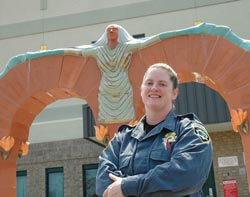University Communications and Marketing
Finding a healing solution -- from the inside out
July 7, 2008
Contacts:
Dan Carter, 657-2269
MSU Billings student mixes social responsibility, business plan knowledge on concept to help women prisoners in recovery
 MSU BILLINGS NEWS SERVICES — When Gloria Soja was 25 years old, she was living through some dark times. She
doesn’t talk about it much and whether it was a series of bad choices, bad circumstances
or bad timing really doesn’t matter. At that time — she admits seven years later —
she didn’t know if she would see 26.
MSU BILLINGS NEWS SERVICES — When Gloria Soja was 25 years old, she was living through some dark times. She
doesn’t talk about it much and whether it was a series of bad choices, bad circumstances
or bad timing really doesn’t matter. At that time — she admits seven years later —
she didn’t know if she would see 26.
“I was really in a bad place in my life,” said Soja, a short, bright-eyed red head who is finishing a business management degree this fall at Montana State University Billings.
The light that led her from darkness was provided by some Lakota Indian friends in her native Canada. Through cultural values, spirituality and principles taught to her by those friends, her life was put back on a track to success.
Now she wants to help others do the same.
“The gifts we are given are meant to be shared,” she says.
For Soja, it’s all about being sober and well. In other words, “welbriety.”
She has been able to pinpoint a need for a wellbriety mission — an entity and place that supports female offenders through their recovery journeys though a focus on American Indian spirituality and values — with her life, work and student experiences.
So she decided to repay gifts given to her, mix it with an entrepreneurial spirit learned at the MSU Billings College of Business and add some perspective as a corrections officer at the Montana Women’s Prison and develop a plan for a new program.
Her idea won rave reviews at the annual business plan competition at the University of Montana in late April and will soon be unveiled to people in Billings as she works on collaborative relationships to get the plan off the ground. She already has interest from like-minded individuals in Great Falls and hopes to gain local fans later this summer.
Called Warrior Down Wellbriety Mission, the idea is to develop a relapse prevention and recovery support program based on American Indian traditions and values.
“The program is designed to ensure the success of female offenders re-entering the community,” the business plan says. “Warrior Down takes transitional living a step further and focuses on healing through Native American spirituality.”
Since part of the foundation of the Warrior Down proposal is based on building trust and relationships, Soja said she will be holding conversations with people in the Billings community to gauge their support for not only the concept, but eventually for a transitional living community.
Called a “second chance home,” the Warrior Down community would provide a place for mentoring, support and resources. It would target American Indian women, who make up about 25 percent of the offenders in the Montana Women’s Prison. Interviews with inmates at the prison last year indicated a strong interest in the concept, mostly because a similar program doesn’t currently exist.
Different social service agencies, faith-based groups and individuals offer segments of what Soja is trying to do, but no single entity ties it all together, she said.
She is working with leaders of White Bison, Inc., in Great Falls, a similar culturally-based recovery and support organization, to organize the Sacred Web Recovery Coalition. That coalition will provide a statewide network of services and resources to help released offenders and others get their lives back together.
When Soja and College of Business classmates Natalie Gregory, Brad Bauer, Nicole Pribyl and Will Crtalic presented the concept to a panel of judges at a statewide business plan contest in April, they knew they had an uphill battle because they had to present the idea of Warrior Down as a for-profit enterprise.
“We got great feedback,” she said. “We knew the numbers wouldn’t work in a for-profit environment, but people loved the format and the layout of what we wanted to do. The judges told us: ‘Regardless of what happens today, you need to do this project.’ ”
Soja and the Warrior Down team did not win their division, but they did won some hearts and minds.
Since that time, her classmates have graduated from college and have moved on, but Soja is championing the cause. And it’s mostly because of her desire to pay back the healing kindness others gave to her.
“This is something different,” she said. “I know I’m putting myself on the line by building trust and building new relationships. But it’s worth it. If you can develop a healing community, you can heal people.”
